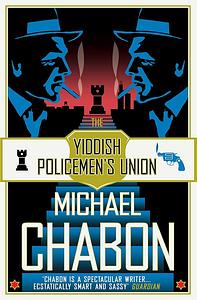Take a photo of a barcode or cover
Noir-Jewish- detective-organized crime-Alaskan Native American-Zionist story that could be made into a film by Wes Anderson.
The first 100 pages are bumpy before the whole thing catches into a smooth rhythm and really takes off.
The first 100 pages are bumpy before the whole thing catches into a smooth rhythm and really takes off.
dark
funny
mysterious
medium-paced
Plot or Character Driven:
A mix
Strong character development:
Yes
Loveable characters:
Yes
Diverse cast of characters:
Yes
Flaws of characters a main focus:
Yes
Lots of boring characters, hard to follow background / setting
Not as exceptional as "The Amazing Adventures of Kavalier and Klay", but saying so is not a slam on any book. Fans of Chabon's writing style and quirky sense of humor will not be disappointed.
adventurous
dark
funny
mysterious
reflective
sad
tense
medium-paced
Plot or Character Driven:
A mix
Strong character development:
No
Loveable characters:
Yes
Diverse cast of characters:
Yes
Flaws of characters a main focus:
Yes
The deck was stacked against this one for me — I don't like hardboiled detective novels, I don't like alternate histories, and I don't like self-loathing, alcoholic, lying protagonists who break all the rules and put themselves in constant danger. On top of that, the book — despite being an ostensibly action-packed murder mystery — was too long, went on too many descriptive detours, and contained too many characters to keep straight (including similarly named characters; when Berko bursts through the door with "Gold" under his arm I thought for about four pages that it was his son, Goldy, rather than the henchman named Gold). I also did not like the female characters — the motherly Esther-Malke, the reclusive wife of the rebbe, the so-mannish-she's-probably-a-lesbian pilot Naomi, the pieman's daughter with the sex addiction, and of course, the only one who gets any substantial time on the page, the main character's hard-nosed ex-wife, Bina, who is now his equally hard-nosed (but still very sexy, as we're constantly reminded) supervisor. And I hated that Landsman and Bina got back together at the end, which played into the problematic narrative that depressed, self-destructive men just need the object of their affection to be with them to have a chance at healing .
Despite all that, it wasn't a bad read; obviously there's a reason that it's lasted so long as a favorite of so many people. I thought the setting, this alternate history where land near Sitka, Alaska, was set aside for Jewish refugees in the 1940s, was just a unique backdrop for a detective novel, but it turns out to be key to the mystery, from the notion that the murder victim could have been the Tzadik Ha-Dor to the international schemings to reclaim Jerusalem that end up playing a role in the unraveling mystery. Even if the female characters were rather unimaginative, the male characters were more complex and real (with the exception of the rebbe, a stereotypical Godfather-type figure whose immense weight makes up most of his characterization). I liked the way clues were pieced together and how certain facts that seemed unimportant at the time ended up being significant. I can't say I actively disliked the whole experience of reading it, but in the end nothing really made up for all the aspects of it I didn't like.
I've heard that The Amazing Adventures of Kavalier & Clay is better, and I look forward to reading that later this year for book club. As for this one, it's an interesting twist on the typical hardboiled detective novel, but overall I can't recommend it.
Despite all that, it wasn't a bad read; obviously there's a reason that it's lasted so long as a favorite of so many people. I thought the setting, this alternate history where land near Sitka, Alaska, was set aside for Jewish refugees in the 1940s, was just a unique backdrop for a detective novel, but it turns out to be key to the mystery, from the notion that the murder victim could have been the Tzadik Ha-Dor to the international schemings to reclaim Jerusalem that end up playing a role in the unraveling mystery. Even if the female characters were rather unimaginative, the male characters were more complex and real (with the exception of the rebbe, a stereotypical Godfather-type figure whose immense weight makes up most of his characterization). I liked the way clues were pieced together and how certain facts that seemed unimportant at the time ended up being significant. I can't say I actively disliked the whole experience of reading it, but in the end nothing really made up for all the aspects of it I didn't like.
I've heard that The Amazing Adventures of Kavalier & Clay is better, and I look forward to reading that later this year for book club. As for this one, it's an interesting twist on the typical hardboiled detective novel, but overall I can't recommend it.
not as good as previous books of his i read. imaginative story that was lacking a little spark or something...
I'm coming to terms with the fact that alternative history fiction may not be for me. Chabon's The Yiddish Policeman's Union, goes down in my library as another book that had a lot of ideas, with little to no execution on said ideas.
The setting is interesting enough, the United States has allowed European Jews to settle in Alaska in the 1940s, thus creating a U.S. territory that is for intents and purposes a refuge from the Holocaust. Enter our protagonist, a run down detective who is at bad at chess as he is at stopping himself from drinking. Riding along with Detective Landsman is fun enough, he's a very classical trope of the damaged hero who talks bad, but might have a good heart if you could just see it through all the cigarette smoke. He gets into lots of trouble involving nearly every principality that exists in Alaska, and he usually has a clever and wry remark for all of them.
Like nearly all alternative history fiction, the wheels quickly fall off once plot or narrative structure come into play. The actual plot of this book is borderline nonsensical, lots of discussions are held on chess theory, the implications of the Tzadik ha-Dor to a fictional sect of Hasidic Jews, and backroom politics that are usually out of scene to any relevant character. Most of that isn't a problem, lots of books feature at least one of those topics (although very few of the first two). What becomes a problem in my reading was Chabon's desire to have all of these topics wrapped up in layers of upon layers of prose. At times it can be incredibly rewarding and fun, Chabon has a strong sense or irony and humor that is heavily used throughout the book, but often times it's a drag. In this book, if a character were to walk into a movie theater it would say something like: "the air was clouded with a decade of burnt popcorn with walls the color of an onion that had been left out just a little too long." Having style is all well and good, but once the plot structure begins to crumble, the weight of the prose is just way too much to handle.
The experience of reading The Yiddish Policeman's Union was unsurprisingly similar to most other alternative history fiction I've come across. An interesting, and frankly, hyper focused setting, intriguing ideas, and one of the least memorable endings I've come across in some time. Ultimately, the bright spots weren't worth the trudge for me.
The setting is interesting enough, the United States has allowed European Jews to settle in Alaska in the 1940s, thus creating a U.S. territory that is for intents and purposes a refuge from the Holocaust. Enter our protagonist, a run down detective who is at bad at chess as he is at stopping himself from drinking. Riding along with Detective Landsman is fun enough, he's a very classical trope of the damaged hero who talks bad, but might have a good heart if you could just see it through all the cigarette smoke. He gets into lots of trouble involving nearly every principality that exists in Alaska, and he usually has a clever and wry remark for all of them.
Like nearly all alternative history fiction, the wheels quickly fall off once plot or narrative structure come into play. The actual plot of this book is borderline nonsensical, lots of discussions are held on chess theory, the implications of the Tzadik ha-Dor to a fictional sect of Hasidic Jews, and backroom politics that are usually out of scene to any relevant character. Most of that isn't a problem, lots of books feature at least one of those topics (although very few of the first two). What becomes a problem in my reading was Chabon's desire to have all of these topics wrapped up in layers of upon layers of prose. At times it can be incredibly rewarding and fun, Chabon has a strong sense or irony and humor that is heavily used throughout the book, but often times it's a drag. In this book, if a character were to walk into a movie theater it would say something like: "the air was clouded with a decade of burnt popcorn with walls the color of an onion that had been left out just a little too long." Having style is all well and good, but once the plot structure begins to crumble, the weight of the prose is just way too much to handle.
The experience of reading The Yiddish Policeman's Union was unsurprisingly similar to most other alternative history fiction I've come across. An interesting, and frankly, hyper focused setting, intriguing ideas, and one of the least memorable endings I've come across in some time. Ultimately, the bright spots weren't worth the trudge for me.
dark
emotional
funny
mysterious
tense
medium-paced
Plot or Character Driven:
Character
Strong character development:
Yes
Loveable characters:
Complicated
Diverse cast of characters:
Yes
Flaws of characters a main focus:
Yes
dark
emotional
funny
hopeful
sad
medium-paced





